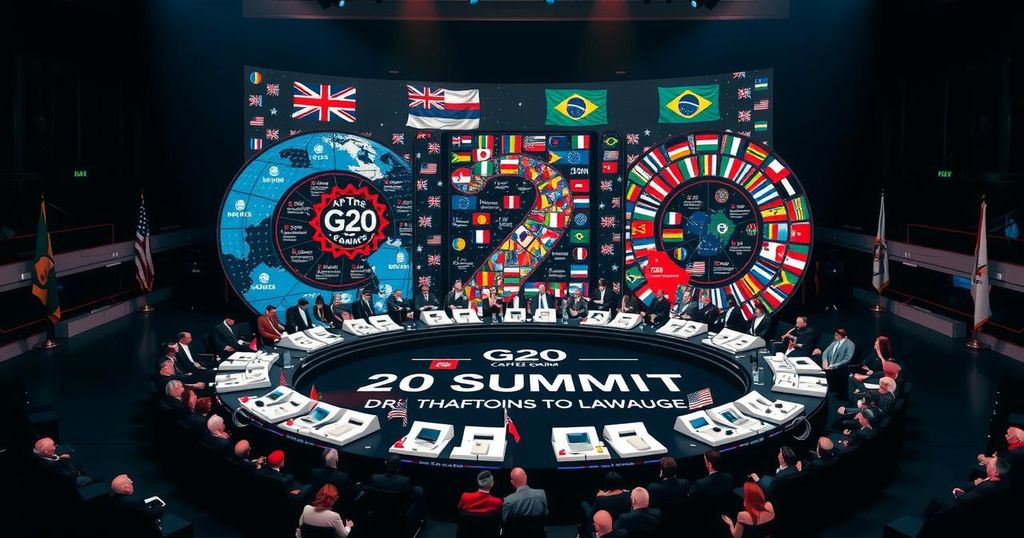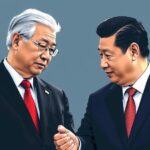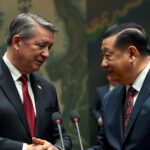Politics
AMERICA, AP, ASIA, BARACK OBAMA, BILATERAL TALKS, BOLSONARO, BRAZIL, CHINA, CRISTIANE LUCENA CARNEIRO, EUROPE, EUROPE/ASIA, FOREIGN POLICY, FRANCE, GAZA, GAZA STRIP, GEOPOLITICS, ISRAEL, JAIR BOLSONARO, LU, MEXICO, MIDDLE EAST, NORTH AMERICA, OF SAO PAULO, RIO DE JANEIRO, RUSSIA, SOUTH AMERICA, TRADE RELATIONS, U. S, UKRAINE, UNIVERSITY, UNIVERSITY OF SAO PAULO
Sophia Klein
Brazil G20 Summit: Global Tensions and the Impact of Trump’s Election
Brazil is preparing to host the G20 summit amid geopolitical tensions and Donald Trump’s recent election. Expectations for a substantial declaration regarding global conflicts are low, with a focus shifting towards social issues such as hunger. Lula’s foreign policy contrasts with Bolsonaro’s, emphasizing diplomacy and cooperation but is met with challenges from differing national priorities among G20 nations. It’s unclear how the political changes in the U.S. will affect international collaboration, particularly with key leaders absent.
Brazil is poised to host the G20 summit amid heightened global tensions, particularly due to ongoing conflicts and recent political shifts in the United States. From November 13-14, 2024, Rio de Janeiro will welcome leaders from both developed and developing nations, but expectations for a robust geopolitical declaration appear low. The prevailing sentiment suggests that discussions will shift focus towards social issues such as hunger eradication rather than contentious political matters like the wars in Ukraine and the Middle East. The summit’s atmosphere is further complicated by Donald Trump’s recent election victory, which has cast uncertainty over U.S. foreign policy and its approach to multilateralism. Many experts predict that achieving consensus on divisive issues will be challenging, especially as negotiations involve differing priorities from participating countries, including contentious objections from Argentina concerning economic matters. Brazil’s President Luiz Inácio Lula da Silva has sought to navigate these complexities, promoting a declaration aimed at peace and social initiatives while trying to accommodate the divergent views of G20 members. Lula’s foreign policy contrasts markedly with that of his predecessor, Jair Bolsonaro, who favored ideological positions and fostered international discord. Lula, who is known for his diplomatic skills and commitment to social agendas, has prioritized hunger as a focal point for Brazil’s G20 objectives, aiming to leverage the summit to launch a Global Alliance Against Hunger. This aligns with his previous successes in reducing undernourishment in Brazil during his earlier terms as president. As the summit approaches, leaders, including President Biden, are expected to address pressing global issues, including climate change and international stability. Biden’s involvement underlines the significance of the summit, yet questions remain about the sustainability of any agreements reached, particularly in light of Trump’s skepticism towards multilateral initiatives. The dynamics among member nations may shift further, as alliances may be reconsidered in response to the changing political landscape in the U.S. With leading figures absent from the summit, such as Russian President Vladimir Putin, the dialogue may avoid critical geopolitical topics, allowing Brazil to maintain a semblance of neutrality amid complex international relations. However, with looming uncertainties surrounding U.S. leadership, the effectiveness of the G20 summit efforts will largely depend on the ability of participating countries to forge collaborative solutions and prioritize essential social issues over divisive geopolitical conflicts.
The G20 summit serves as an essential forum for major economic powers to discuss global issues, including trade, climate change, and geopolitical tensions. This particular summit in Brazil comes at a time when significant conflicts, including those in Ukraine and the Middle East, continue to impact international stability. Moreover, Donald Trump’s election victory presents a unique challenge to multilateralism, as his administration is expected to prioritize America First policies, potentially altering the collaborative spirit of G20 discussions. Brazil’s shift in leadership from Jair Bolsonaro to Luiz Inácio Lula da Silva marks a return to active engagement in international diplomacy, emphasizing social concerns like hunger and poverty, which are pivotal in Lula’s agenda. However, countries have diverging interests, impacting the potential outcomes of summit discussions. With key players negotiating over their priorities, especially with Argentina’s objections impacting the final declaration, the summit’s focus may move away from contentious geopolitical declarations towards more universally acceptable social commitments. This dynamic raises further questions about the future of international cooperation in addressing complex global issues.
In conclusion, the upcoming G20 summit in Brazil is set against a backdrop of significant geopolitical tensions, particularly with the impact of Donald Trump’s election victory on multilateralism. While Brazil under President Lula aims to steer discussions towards social issues such as hunger eradication, challenges stemming from differing national interests, particularly with Argentina, may hinder the potential for strong collective agreements. Ultimately, the success of the summit will depend on the leaders’ ability to find common ground amid these complexities and prioritize collaborative efforts for global well-being.
Original Source: www.nbcmontana.com








Post Comment